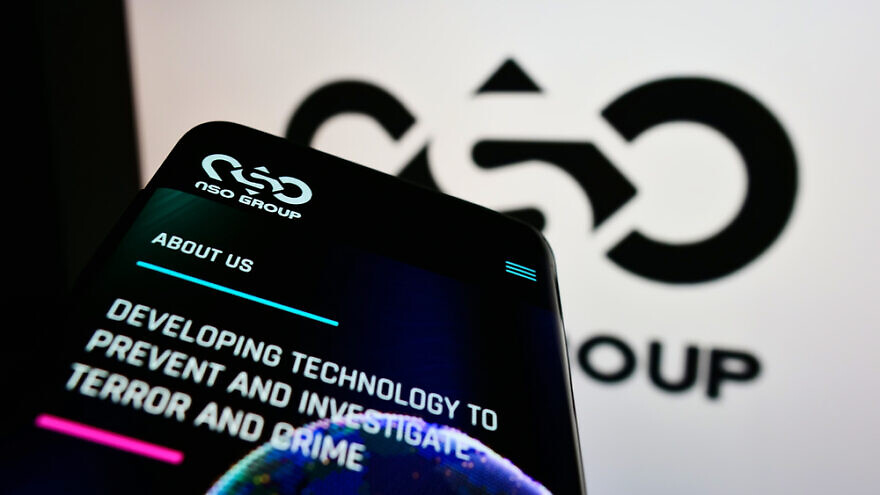
“Big Brother is watching you!”
The British writer George Orwell once portrayed a “listening empire” in his novel, in which surveillance is ubiquitous. And this phrase is being translated into reality.
The “phone-hacking scandal” case of an Israeli spy software has become an international sensation, with more than 50,000 potential wiretap targets in more than 50 countries around the world.
On July 18, 2021, a joint media investigation by the Guardian and a dozen other international media outlets and two international organizations revealed that Pegasus, a spy software developed by the Israeli NSO group, was allegedly used to wiretap politicians, journalists and business executives in multiple countries.
The leaders of many countries, including French President Macron, King Mohammed VI of Morocco, South African President Ramaphosa, Iraqi President Saleh and other dignitaries, who were wiretapped, are pressuring the Israeli government to make the results of the Bennett administration’s investigation public.
The “Pegasus” wiretapping incident caused by the storm, but also in many countries around the world continue to ferment.
“50,000 cell phone numbers worldwide” bugged?
It is reported that the first to notice this spy software is some international organizations, they obtained a list containing 50,000 cell phone numbers.
Subsequently, 17 media organizations, including the U.S. Washington Post, the British Guardian, and the French newspaper Le Monde, joined the investigation.
The investigation is publicly known as – “Project Pegasus”.
In this list of phone numbers obtained by the investigation team, the country with the most numbers attributed to it is Mexico, with more than 15,000. The targets included heads of state and prime ministers, as well as several Arab royals, at least 65 business executives, 85 human rights activists, 189 media journalists and more than 600 politicians and government officials.
“Pegasus is a cell phone spy software that can extract important data from a person’s phone and remotely turn on the phone’s microphone and camera for real-time recording and video without the user’s knowledge.
India’s “The Wire” website found that these numbers were leaked, including India’s 40 journalists, many of the Times of India, the Hindustan Times and other media journalists, as well as three “major opposition figures,” two Modi government The current ministers, as well as security agency officials.
What is intriguing is the “sensitive” timing of these wiretaps, with politicians almost always in the midst of elections and journalists following key events.
On July 18, The Guardian reported that at least 10 governments were customers of Pegasus software, such as India, Hungary, the United Arab Emirates, Morocco, Mexico, Azerbaijan and others.
NSO Group denied it to the media. We are examining every allegation and if some of them are true, we will take severe action and we will terminate the contract as we have done in the past,” responded the group’s chief executive Shalev Julio.

A “political earthquake” has been triggered
The “Pegasus” software “wiretapping door” after the exposure, among the country’s dignitaries are worried.
According to French newspaper Le Monde, French President Macron’s cell phone has become the target of “Pegasus” software wiretapping, probably in 2019.
After the incident came to light, Macron changed his phone and number, and spoke with Israeli Prime Minister Bennett to stress the importance of “properly investigating” the software.
The mission’s findings suggest that Morocco, a close ally of France, was likely interested in information about Macron and his staff. In response, the Moroccan side reacted sharply. According to foreign media reports, Morocco intends to file a lawsuit against the international organization that led the revelation, suing for defamation.
Also involved in the maelstrom are the Indian government’s critics.
Of the 50,000 numbers, more than 300 Indian numbers are considered to be the target of interest to Pegasus customers.
On July 22, when the Indian Minister of Electronics and Information Technology was about to issue a statement from the central government on the Pegasus software, the statement was taken down and torn up by opposition MPs, and Parliament had to be adjourned.
According to Pakistan’s Dawn newspaper, the Pakistani Foreign Ministry issued a statement on the same day strongly condemning the Indian government’s ongoing widespread espionage activities and calling on the United Nations to launch a full investigation into the matter.
Foreign Policy magazine directly defined the incident as “India’s Watergate”.
In fact, this is not the first time that NSO has been accused of similar things. Back in 2019, the Indian government was given a list of 121 people whose phones had been tapped by Pegasus in WhatsApp’s accusations against the NSO group. But the Indian government neither admits nor denies that it bought Pegasus.
Indian journalist Abhinandan told that such a parliamentary battle is unlikely to have an impact on the Modi government, and that opposition leaders, including Rahul Gandhi, are only using the issue to disrupt parliament.
Dai Yonghong, director of the Bay of Bengal Rim Institute at Shenzhen University’s China Institute of Overseas Interests, told that although some information is still unconfirmed, “the Indian opposition coalition will definitely seize this opportunity provided by the outside world to take on the Indians’ government.”
Hungary’s Prime Minister Orban’s government was also revealed to have used “Pegasus” software in its battle with opponents, targeting at least 10 lawyers, one opposition politician and five journalists.
But Hungarian Justice Minister Varga declined to comment on the incident, saying that “every country needs such tools.
In addition to France, India and Hungary, the largest source of numbers on the list of data leaks is Mexico, reaching more than 15,000, including politicians, trade union representatives, journalists and other critics.
“phone-hacking scandal has not only had an impact on the domestic politics of individual countries, but has also created a crisis of confidence in their international relations. It looks like a series of “political earthquakes” triggered by a data security earthquake.
“Digital technology has become a constituent element of political power, and the means of gaming political power has gradually changed from traditional means to digital technology.” Dai Yonghong believes.
The political storm triggered by the “Pegasus” incident has caused a chain reaction in many countries.
Clearing the air, investigating and stopping the damage
Countries accused of wiretapping leaders of other countries have been busy issuing statements to clear their names, while those whose leaders may have been wiretapped have begun investigations. Israel, for its part, is concerned about the potential serious diplomatic repercussions of the scandal and is taking steps to “stop the damage.
On July 21, the Saudi Press Agency quoted a Saudi official as saying that Saudi Arabia did not use “Pegasus” software to carry out wiretapping activities. But the media mission reported that the Israeli government explicitly allowed the NSO group to cooperate with Saudi Arabia in 2017, in a deal allegedly worth more than $55 million.
For its part, the office of Hungarian Prime Minister Orban said on the matter that any surveillance carried out in the country was done in accordance with the law, and that state agencies authorized to use covert tools were constantly monitored by governmental and non-governmental agencies.
Rwanda’s foreign minister also said they had not used the Pegasus software “because Rwanda does not have any kind of capacity to use this technology.
For its part, the Moroccan government posted: “Morocco strongly condemns the massive and malicious false media campaign, rejects these baseless allegations and condemns the purveyors of this information.”
As related incidents continue to fester, Israel is under increasing diplomatic pressure.
In response to the “Pegasus” software furore, the Israeli government has prepared to establish a special interdepartmental group consisting of representatives from the Defense Ministry, Justice Ministry, Foreign Ministry, Military Intelligence and the Intelligence and Secret Service (Mossad) to determine whether a “policy adjustment” is needed for sensitive cyber technology exports. policy adjustments” on sensitive cyber technology exports.
Who is “behind the scenes”?
In the aftermath of the incident, there have been many suspicions about who was behind the incident.
In India, for example, the most criticized party in the incident is probably the Modi government. According to a July 23 Times of India report, Rahul Gandhi, leader of India’s largest opposition party, the Congress Party, said that “Prime Minister Modi and Home Minister Shah used spy software to wiretap state institutions and political figures, which is an act of treason.” He called for an investigation into Modi, which should be overseen by the Supreme Court, and for Shah’s resignation.
On July 23, according to Pakistan’s Dawn newspaper, the Pakistani Foreign Ministry issued a statement strongly condemning the Indian government for engaging in ongoing widespread espionage and calling on the United Nations to launch a full investigation into the matter.
It is noteworthy that unlike the United States, India does not have a special tribunal that authorizes state agencies to conduct surveillance.
Former Indian Union Minister and Member of Parliament Manish Tewari tried unsuccessfully to introduce a private bill in Parliament to regulate the functions and use of powers of India’s intelligence agencies.
“As of now, there is no substantial evidence that the matter was directed by Modi, other than the motive pointing to him.” Legal Daily’s correspondent in Sri Lanka, Chen Runze, wrote in a report on July 26.
It is interesting to note that since the 50,000 phone numbers on the survey list include 12 U.S. numbers and that NSO made a point of stating in a statement released that their product could not be used to monitor U.S. cell phone numbers.
In this regard, Huang Rihan, director of the World Civilization Dialogue Research Center at Overseas Chinese University, said in an interview with that the “Pegasus” software has become an important software used by many countries to monitor their opponents and suppress citizens’ opinions, “We cannot rule out that behind the scenes Israel and the United States have shared information. In fact, since the 1950s, Israel and the United States have had a very deep intelligence cooperation.”
In addition, the international organization’s investigation report also revealed that its technical staff analyzed Pegasus and found that it used Amazon’s CloudFront service. on July 20, 2021, according to U.S. media Vice, Amazon has stopped providing infrastructure and other services to the NSO company.
International wiretapping and eavesdropping scandals have occurred in recent years.
Huang Rihan said that to be able to effectively protect the privacy and security of global citizens and organizations, it is necessary for developed countries and developing countries to really effectively and efficiently launch a convention that is conducive to global network governance and to develop an effective punishment mechanism. “This thing is a long way to go.”